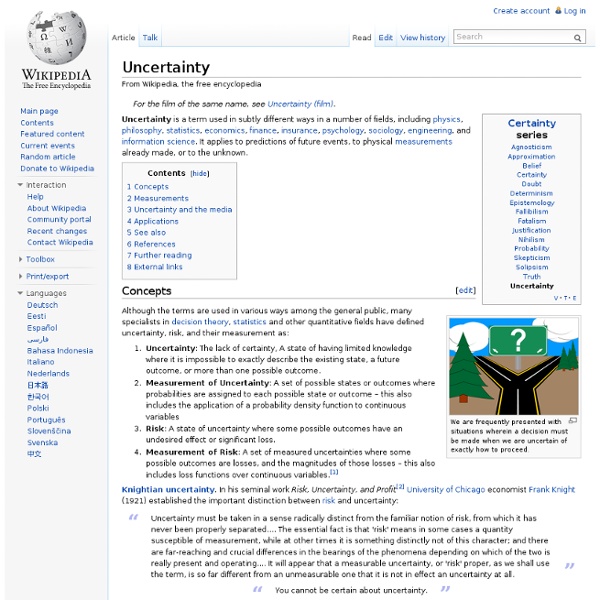Orders of magnitude (probability)
This page lists events in order of increasing probability, grouped by orders of magnitude. These probabilities were calculated given assumptions detailed in the relevant articles and references. For example, the probabilities of obtaining the different poker hands assume that the cards are dealt fairly.
History of probability
History of a field of mathematics Probability has a dual aspect: on the one hand the likelihood of hypotheses given the evidence for them, and on the other hand the behavior of stochastic processes such as the throwing of dice or coins. The study of the former is historically older in, for example, the law of evidence, while the mathematical treatment of dice began with the work of Cardano, Pascal, Fermat and Christiaan Huygens between the 16th and 17th century. Probability is distinguished from statistics; see history of statistics. While statistics deals with data and inferences from it, (stochastic) probability deals with the stochastic (random) processes which lie behind data or outcomes. Etymology[edit] Origins[edit] Ancient and medieval law of evidence developed a grading of degrees of proof, credibility, presumptions and half-proof to deal with the uncertainties of evidence in court.[2] In ancient times there were games played using astragali, or Talus bone. Eighteenth century[edit]
Outline of probability
Overview of and topical guide to probability Probability is a measure of the likeliness that an event will occur. Probability is used to quantify an attitude of mind towards some proposition whose truth is not certain. The proposition of interest is usually of the form "A specific event will occur." The attitude of mind is of the form "How certain is it that the event will occur?" The certainty that is adopted can be described in terms of a numerical measure, and this number, between 0 and 1 (where 0 indicates impossibility and 1 indicates certainty) is called the probability. Introduction[edit] Probability and randomness. Basic probability[edit] (Related topics: set theory, simple theorems in the algebra of sets) Events[edit] Elementary probability[edit] Meaning of probability[edit] Calculating with probabilities[edit] Independence[edit] Probability theory[edit] (Related topics: measure theory) Measure-theoretic probability[edit] Independence[edit] Conditional probability[edit] Expectation[edit]
Probability
These concepts have been given an axiomatic mathematical formalization in probability theory, which is used widely in such areas of study as mathematics, statistics, finance, gambling, science (in particular physics), artificial intelligence/machine learning, computer science, game theory, and philosophy to, for example, draw inferences about the expected frequency of events. Probability theory is also used to describe the underlying mechanics and regularities of complex systems.[5] Interpretations[edit] When dealing with experiments that are random and well-defined in a purely theoretical setting (like tossing a fair coin), probabilities can be numerically described by the number of desired outcomes divided by the total number of all outcomes. Etymology[edit] The word probability derives from the Latin probabilitas, which can also mean "probity", a measure of the authority of a witness in a legal case in Europe, and often correlated with the witness's nobility. History[edit] where , or . If



